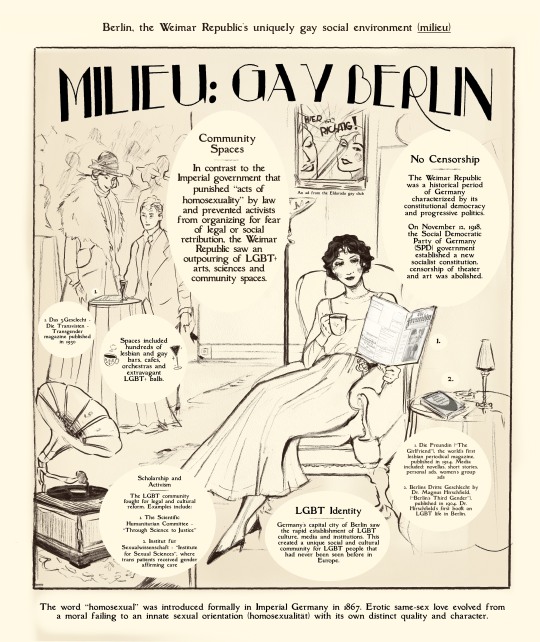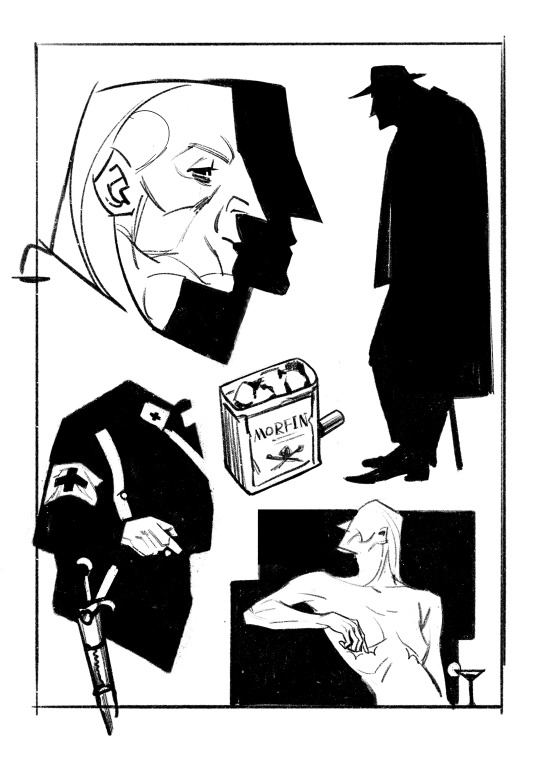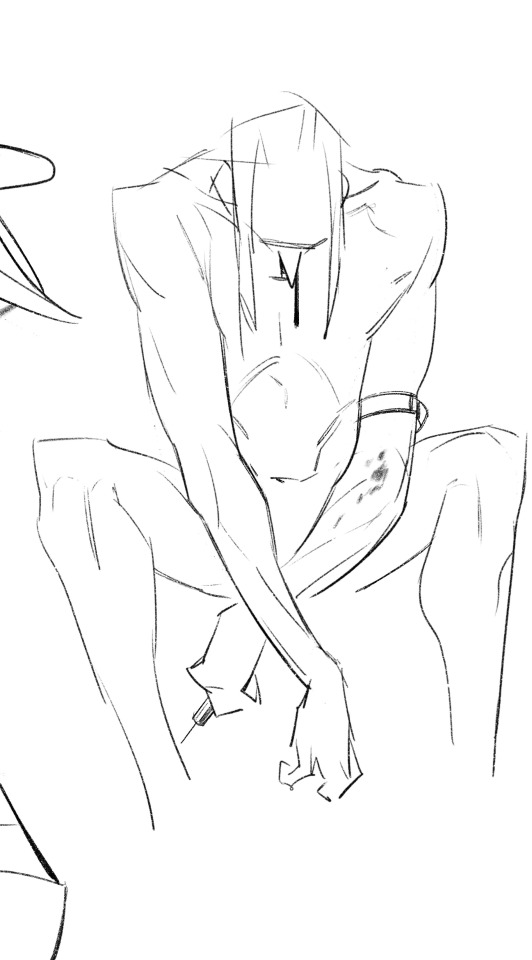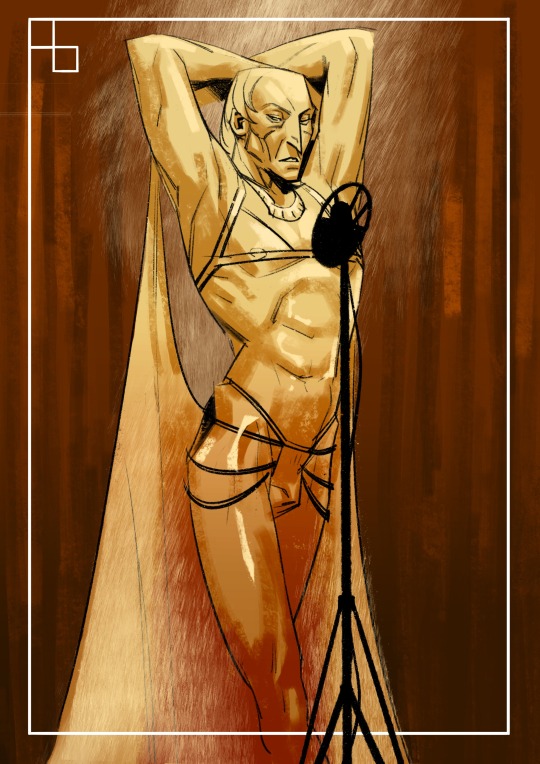#Weimarer republik
Explore tagged Tumblr posts
Text
The new secret vibe unlocked: I'm reading "Gay Berlin: birthplace of a modern identity" now and in the second chapter it tells about a crossdressing costume balls that were a thing since 1860s. Sometimes there were same-sex events where half of guests were wearing an opposite-sex clothing, sometimes there were the events where dames and gentlemen that performed opposite sex' roles and dressed as such danced with each other. They were quite popular among Berlin residents and guests, so it may be a canonical moment in your Belle Epoque AUs.
#what do you think about this au but with neubauten?#I thought about something like that whenever I see the hat era B.#I would be glad if somebody drew this#okay now#weimarer republik
12 notes
·
View notes
Text

"Milieu: Gay Berlin" - an exploration of LGBT+ identities in the Weimar Republic (1920's Germany).
Based on "Gay Berlin" by Robert Beachy.
Did you know the roaring 20s have *always* been queer, both 100 years ago and now?
-----------
Note: I didn't have enough space to cover Dr. Magnus Hirschfield properly but he will be the subject of my next infographic. Dr. Hirschfield was a gay Jewish doctor and activist who created the first medical institute (Institut für Sexualwissenschaft) for LGBT+ people. He pioneered transgender care!
#LGBT+#lgbt history#lgbtq books#lgbtq history#weimar republic#weimar germany#1920s#roaring 20s#queer history#trans history#gay history#lesbian history#bi history#weimarer republik#history#infographic#gay berlin#berlin germany#berlin
210 notes
·
View notes
Text

more old non-bi folk more
34 notes
·
View notes
Text


administration building of the regionalverband ruhr // essen südviertel
architect: alfred fischer
completion: 1929
the administration building, which was renovated a few years ago, is a successful example of new construction in the ruhr region. the mixture of new objectivity and expressionism creates a complex that is still modern in its design today.
#moderne#neues bauen#new objectivity#neue sachlichkeit#design#alfred fischer#reginalverband ruhr#ruhrpott#ruhrgebiet#nrw#germany#photograpy#architecture#architecture photography#urban photography#modern brick architecture#weimar republic#Weimarer republik#zwanziger jahre#bauhaus#brick#expressionismus#expressionism
65 notes
·
View notes
Photo

#mp#conrad veidt#weimar republic#weimarer republik#silent film#silent cinema#need him so bad... and his gender also#hes so fucking cute#1920s
59 notes
·
View notes
Text
thinking about her (Magnus Hirschfeld's „Institut für Sexualwissenschaften” [institute for sexual sciences])
7 notes
·
View notes
Text
Rudolf Berthold (Part 3)
Disclaimer: Now starts a part of German (and European) history that is highly controversial. The period shortly before the end of the war and the years afterwards were a mess of revolutions, fighting, terrorism and murder. Opinions of how good/bad it was depend on political/ideological convictions. For the sake of keeping it short, I will simplify and only mention events that are necessary to tell Bertholds story.

During the last month of the war Berthold still had hope that he will be able to return to the front: “I want to go back out to the frontlines! If only I had my healthy bones – but I can still do it. As long as the battle rages everyone with experience belongs out there.” But his health was too unstable for even his iron will to make a return possible. He returned to his home and waited. For what he wasn´t sure.
In November the situation at the front and in Germany worsened and Marine troops started mutinies. Revolutions broke out, inspired by the Bolshevik revolution in Russia. Berthold was a fervent monarchist and held on to his Kaiser and the established social order. “Overthrow! Constitutional change! In a few days, what strong men have built up over centuries will be destroyed. The people have been seduced. Doubts are cast on the army. We're still far in enemy territory and we're supposed to surrender? Madness!”. Bertholds opinion on all that was happening is clear.
After the Armistice in November a semi-civil war broke out in the bigger German cities. Communists, Socialists, Bolsheviks on the left; Nationalists and Monarchists on the right; Social Democrats in the middle. Mix in some Anarchists and foreign agents and the disaster was perfect. The soldiers returning from the front were being pursued by all sides to join. By many they were not treated well, their uniforms were ripped and they were called to throw down their weapons and join the fight against militarism. But many soldiers were still loyal to the emperor and did not want to accept the looming Republic.
Especially at the end of 1918 to early 1919 the communists were very powerful. The left-wing Spartakus movement tried to overthrow the government in Berlin and took over Munich. Separatists in Western Germany called for independence of the Rhineland.
Berthold spend the rest of 1918 depressed at home. He felt angry, devastated and useless but he stayed true to his convictions: “The oath of allegiance I once swore I keep for life. A life that now lies so dark before me!”. But his mood and his perspectives changed when more and more Freikorps units (mostly right-wing paramilitary units, used by the Social Democratic government to defend itself and suppress the communist/Bolshevik uprisings) were established. He saw that there was still fight in some men.
The newly formed Reichswehr (official military of the new German state) offered the Hauptmann an active duty posting at Döberitz Airfield. He soon was back in uniform, training men. His charisma and leadership ability enabled him to even get along with the Worker´s and Soldier´s Councils (that caused a lot of trouble in other places). But shortly after, Berthold was ordered to close the Airfield and dismiss his men. Berthold worried that the ever rising number of unemployment would drive the men towards the Spartakus and similar movements.
When Munich, capital of Bertholds home region, was taken over by Communists in April 1919 and proclaimed a “soviel republic”, several Freikorps from all over of the country came to free it. For Berthold this was a turning point. He saw a purpose again. He now saw an opportunity to keep fighting for his country. He put out a call for young men to join him and form their own Freikorps. Soon he had gathered around 1,200 men for his “Eiserne Schar Berthold”. He trained the mostly very young farmers boys and in August they answered the call to go to the Baltics to fight the Bolsheviks there.

Berthold and his men travelled to Mitau, Lithuania to join with the Eiserne Division (Iron Division). There, Germans and anti-Bolshevik Russian were fighting the Red Army side by side. But also local troops that wanted complete independence and both Germans and Russians out of their country. It was a brutal fight from all sides. Bertholds right hand was still paralyzed, he was not able to join in the active fighting but he rallied and motivated his men with great success. They came into the suburbs of Riga but then it was over. Pressure from the German government to cease fighting and return home as well as strong resistance made it impossible to keep fighting. The Freikorps did not get any new supplies, be it food or weapons; something that even Bertholds iron will and dedication could not substitute.
Starving and their numbers greatly decimated Berthold and his group returned to Germany in December 1919. There it was demanded that the Eiserne Schar be disbanded. Bertold did not agree to this, knowing that there was nothing waiting for him or his loyal fighters. They were ordered to report to several different locations, finally ending up in Harburg (near Hamburg), which was governed by Independent Socialists. During this time a military-backed putsch (“Kapp-Putsch”) to overthrow the Government in Berlin was about to be carried out, with support of Lieutenant-Commander Hermann Erhardt, with a Freikorps of his own.

Berthold was accused of wanting to come to its support and ordered to give up his weapons. Harburg officals ordered the officers of the Reichswehr stationed in the town to be arrested. Tensions rose and Berthold met with town representatives who promised safe accommodations and later on transportation for his troops. He and his men went to make camp in the local school. Local union trade leaders demanded of the Reichswehr soldiers to subdue Berthold but they were ordered to stay out of it. The trade leaders then called for their workers to take up arms against the Eiserne Schar Berthold. The men in the school readied their weapons, including machine guns, to defend themselves against the advancing lynch mob. A fight broke out (it is unclear who fired the first shot). Bertholds men were outnumbered and being fired at from all sides. Many died inside the school. After a while a cease fire was called. Berthold managed to come to an agreement with the local authorities: His men were to give up their arms and then be allowed to leave the city unharmed. But that deal was broken the second a disarmed Berthold and his men stepped out of the school. Some local sympathizers warned Berthold that he will be attacked and should try to sneak out on his own but he refused to leave his men. That was his doom. The men were attacked from all sides the second they stepped out of the school and soon lost sight of their leader. Shortly after one of the attackers called out tauntingly: “There lies your great leader”. The men of the Eiserne Schar Berthold looked towards a street corner where an unrecognizable body lay in the gutter.
Autopsy results:
The captain's blue tunic was completely torn open. There were severe scratch wounds to the neck. Terrible piston blows had shattered the entire top of his skull. Seven shots in the head, left and right chest shots, all from behind. The spine was completely separated.
Bibliography:
Iron Man – Rudolf Berthold: Germany´s indomitable fighter ace of World War I, Peter Kilduff
Kamerad Berthold, Thor Goote
Rudolf Berthold, Ludwig F. Gengler (this book consists mainly of Bertholds diary)
Die Geächteten, Ernst von Salomon
#Rudolf Berthold#Poor Rudi you deserved better#y´all the way I cried when I first read about his death#fuck communists#Weimarer Republik#Weimar Republic#Freikorps#wwi
19 notes
·
View notes
Photo

“Der Kampf mit dem Drachen der Not [Fighting the Dragon of Poverty / Destitution],” Simplicissimus. Vol. 37, issue 15, July 10, 1932. ---- Die Lanze der Verordnung sticht doch nur den Drachen leider nicht.
[Unfortunately, the lance of decree just doesn't pierce the dragon.]
A somewhat heroic St. George-ish Franz Von Papen tries to lance the dragon afflicting Germany with poverty, need, economic distress, and destitution, but the lance of ‘government decree’ kills only the victim, not the cause. Of course, one of the odd feelings reading old issues of Simplicissimus is that though we know von Papen as one of the gravediggers of German democracy, he is generally presented in these pages as a totally normal politician dealing with not so normal situation.
#social crisis#rule by decree#state of emergency#franz von papen#weimar republic#weimar germany#crisis of the weimar republic#capitalism in crisis#poverty relief#st. george and the dragon#weimarer republik#gravediggers of german democracy
13 notes
·
View notes
Text




The other day I went to the WEIMAR WEIBLICH (WEIMAR FEMALE) exhibition of the Frankfurt Film Museum. Something that made me tear up right at the start of the exhibit was their display of old film-diaries in which people saved their feelings and thoughts about the movies they went to. The exhibit also contextualizes the way in which audiences of the 20s were captivated by the stars on their screens. Some of that finds its way into those diaries. Some is visible in early selfie-automaton-poses in which folks imitated movie stars of that era ... I felt such a deep connection and at the same time confirmation of my own feelings of "being under a spell" of performers and motion pictures. I loved that they started the exhibit with these "feelings" that you could deem über-emotional or whatever but it's ultimately one of the key aspects of the affects cinema has on us. It's erotic. It's intense. It's magical (always the potential of dark magic being used/misused). It's overwhelming. The thought that I share this overwhelm with people who lived 100 years ago was so sweet and previous. And yes, those diaries felt like livejournal-tumblr prototypes.
2 notes
·
View notes
Text

Paul Ludwig Hans Anton von Beneckendorff und von Hindenburg (* 2. Oktober 1847 in Posen; † 2. August 1934 auf Gut Neudeck, Ostpreußen) war ein deutscher Generalfeldmarschall und Politiker. (wikipedia)
2 notes
·
View notes
Photo






Ads of Weimarer Republik.
Scanned from BDG Adressbuch : Mitgliederverzeichnis des Bundes Deutscher Gebrauchsgraphiker E. V. Berlin 1926/27
12 notes
·
View notes
Text
Streik!
#Streik! Über die Anfänge der Arbeiterbewegung und erste Arbeitskämpfe in #Lingen, (Stadtarchiv-Reihe Archivalie des Monats)
Streik! Lingens Stadtarchivar Dr. Mirko Crabus berichtet auf der Website des Stadtarchivs über die mühsamen Anfänge der Arbeitskämpfe in Lingen: “Im Zuge der Industrialisierung nutzten die Arbeiter zunehmend Streiks als Mittel, ihren Forderungen Nachdruck zu verleihen. Bald entstanden die ersten Gewerkschaften. Bekämpft wurden sie von den Unternehmern, aber auch vom Staat, der immer wieder…

View On WordPress
#Arbeitskampf#Dr. Mirko Crabus#Eisenbahnausbesserungswerk#Gewerkschaften#Hannover#Kaiserreich.#Lingen (Ems)#Marktplatz#Streik#Weimarer Republik
5 notes
·
View notes
Text



more oldmas/fem oc ehehehe (This is George/Agness)
(I was trying to revive some of my 20s oc and end up just redoing everything)
20 notes
·
View notes
Text
Eine Frau betritt eine Männerdomäne
Die Orgelbauerin von Martin Meyer Weimar, 1919. Paula Bertram hat seit ihrer Kindheit eine Vorliebe für Orgelmusik und den Instrumenten selbst. Frisch geschieden, kehrt sie zu ihren Eltern zurück. Ihr Vater hat ein Unternehmen für Orgelbau, in dem sie mitarbeiten möchte. Dagegen hat ihr Vater allerdings etwas. Der konservative und traditionsbewusste Mann ist strikt dagegen. Paula gibt jedoch…
0 notes
Photo


max beckmann / ernst thoms
5 notes
·
View notes
Text











0 notes